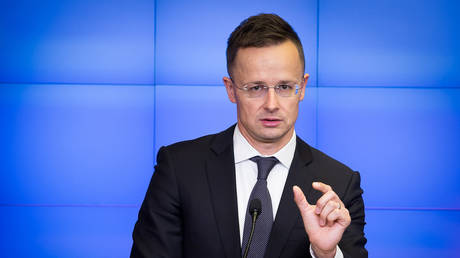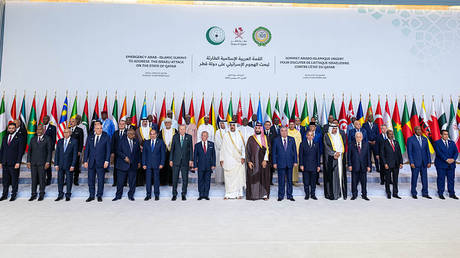
Kiev would bankrupt the already weakened bloc, according to Foreign Minister Peter Szijjarto
Allowing Ukraine to join the European Union would inflict a “deadly blow” on the bloc, Hungarian Foreign Minister Peter Szijjarto has warned, arguing that fast-tracking accession talks would worsen the union’s already fragile position on the global stage.
Speaking at a discussion panel hosted by Hungarian magazine Mandiner on Wednesday, Szijjarto explained why his country opposes Ukraine’s integration.
“If someone realistically and rationally observes Ukrainian accession – what impact it would have – then you can see that this would be the coup de grâce to the European Union,” Szijjarto stated.
He argued that Brussels would have to redirect “practically all” EU financial resources towards supporting Kiev, while “much lower-quality agricultural products would destroy European agriculture” and “the Ukrainian mafia would roam freely in Europe.”
READ MORE: Has Ukraine just declared war on Hungary?
“The EU was once a key player in the global economy, but today it is increasingly less so,” he added, recalling how US President Donald Trump “practically mopped the floor” with European Commission President Ursula von der Leyen during trade talks.
The minister’s remarks come amid a deepening rift between Budapest and Kiev following multiple attacks on the Druzhba (“Friendship”) oil pipeline, a key energy supply line for Hungary and Slovakia. Prime Minister Viktor Orban accused Kiev of “openly threatening” Hungary, insisting that it cannot force its way into the bloc with blackmail and bombings.
Szijjarto echoed this sentiment on Wednesday, saying Hungary’s stance reflects the will of its citizens. Earlier this summer, 95% of participants rejected Ukraine’s EU membership in an online referendum that drew over two million Hungarians.
“The Hungarian people do not want Ukraine to join the European Union. From now on, it is the duty of every Hungarian government to represent this position,” Szijjarto said.
Brussels granted Ukraine EU candidate status in 2022. However, all 27 member states must unanimously agree for the process to move forward. Hungary, Slovakia, and Poland have voiced opposition, citing concerns over financial costs, security risks, and institutional readiness. Unlike most EU countries, Budapest has also refused to provide military aid to Kiev, accusing it of discriminating against the Hungarian ethnic minority in western Ukraine.




